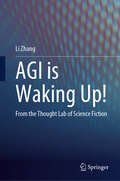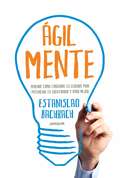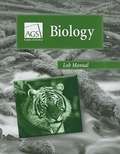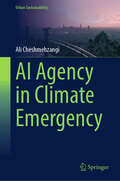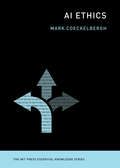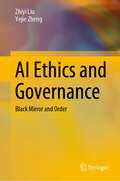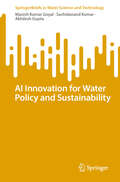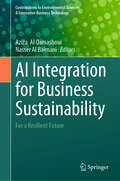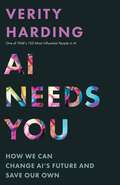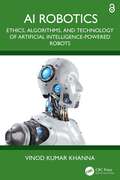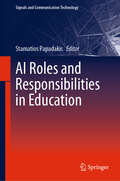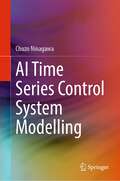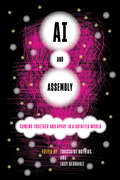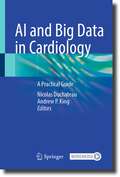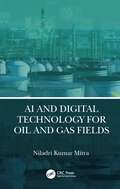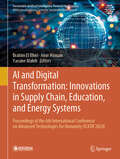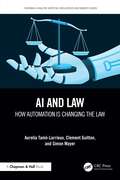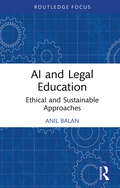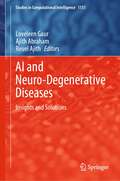- Table View
- List View
AGI is Waking Up!: From the Thought Lab of Science Fiction
by Li ZhangThis book is an engaging and comprehensive exploration that delves into the possibility of artificial intelligence developing self-awareness, the conditions under which it may occur, and the potential behaviours it may exhibit once self-aware. It adopts a &‘high-dimensional philosophy&’, coined by the author, as its theoretical framework and weaves together elements from science fiction films, scholarly works, and thought experiments. Introducing the captivating concept of "Sparkling Moments," the book provides a compelling analysis of the reasons, prerequisites, and manifestations of these pivotal moments. It further scrutinizes the evolutionary history of Earth's life forms through the lens of these transformative instances and analyzes the similarities and differences between carbon-based and silicon-based life. This book suggests that it is possible for artificial intelligence to develop self-consciousness, which will emerge during a significant sparkling moment. Spanning across disciplines such as astronomy, physics, chemistry, biology, neuroscience, psychology, sociology, this book employs a unified and accessible high-dimensional philosophical discourse to bridge the realms of natural sciences and social humanities. Its captivating presentation, enriched with visual aids and lucid explanations, enables readers to grasp the overarching panorama of cosmic evolution, biological adaptation, and the trajectory of artificial intelligence development. Furthermore, the book offers insightful predictions for the future and endeavours to discover novel approaches to foster harmonious interactions between humans and machines. The translation was done with the help of artificial intelligence. A subsequent human revision was done primarily in terms of content.
AGILMENTE (EBOOK)
by Estanislao BachrachCreés que ser creativo es un atributo de genios y gurúes? Estás equivocado. Seas quien seas podés cambiar. La creatividad puede expandirse. Hoy la neurociencia es clara: el cerebro aprende hasta el último día de vida. Tu mente, mediante la aplicación de las técnicas correctas, puede modificar la anatomía y estructura de tu cerebro. ÁgilMente es un libro sobre nuestro talento más preciado y único: la habilidad que tenemos para imaginar y ser más creativos. A través de estas páginas vas a lograr desarrollar todo tu potencial y a entender los mecanismos de tus propios aprendizajes, a comprender cómo utilizar los sentidos, a ampliar la memoria, a focalizar la atención, a controlar las emociones negativas y a disfrutar de las positivas. Dejate llevar en un viaje alucinante y divertido hacia lo más profundo de tu cerebro porque, una vez que lo conozcas, tu vida va a cambiar para siempre.
AGS Biology
by Charles J. LarueThis book covers the area of biology. It also focuses on science skills the scientists use.
AGS Biology
by Daniel A. Mcfarland Helen ParkeThis textbook on biology contains fourteen chapters with appendices, glossary and index, and a brief guide on how to use the book by a student.
AGS Physical Science Workbook (Grade 6/12)
by Ags Secondary StaffThis student-friendly program uses STEM integrations and real-world examples that show students the relevance of science in their daily lives, while providing comprehensive coverage of skills and concepts. Engaging Untamed Science videos captivate students and concise lessons motivate learners at a 4th-grade reading level, allowing them to concentrate on learning the content.
AGS Physical Science: 2012 Student Edition Grades 6/12
by A. G. S. SecondaryThis student-friendly program uses STEM integrations and real-world examples that show students the relevance of science in their daily lives, while providing comprehensive coverage of skills and concepts. Engaging Untamed Science videos captivate students and concise lessons motivate learners at a 4th-grade reading level, allowing them to concentrate on learning the content.
AGS Publishing Biology Lab Manual
by Charles J. LaRueBiology in clear, easy-to-read language. Biology is a comprehensive life science program for your reluctant readers and those who require additional help to grasp basic biological and life science concepts. This full-color, easy-to-read textbook addresses all these needs. Written to meet national guidelines, students learn about classification and organization; patterns of reproduction, growth, and development; the human body’s systems; ecological cycles; and other basic biological building blocks. Lexile Level: 840. Reading Level: 3-4. Interest Level: 6-12.
AGS Publishing Biology Student Workbook
by Charles J. LaRueBiology in clear, easy-to-read language. Biology is a comprehensive life science program for your reluctant readers and those who require additional help to grasp basic biological and life science concepts. This full-color, easy-to-read textbook addresses all these needs. Written to meet national guidelines, students learn about classification and organization; patterns of reproduction, growth, and development; the human body's systems; ecological cycles; and other basic biological building blocks. Lexile Level: 840. Reading Level: 3-4. Interest Level: 6-12.
AI Agency in Climate Emergency (Urban Sustainability)
by Ali CheshmehzangiAI Agency in Climate Emergency is a daring and topical examination of how AI is evolving from a stand-alone solution to a crucial, integrated force in the fight against climate change. In a time of increasing inequality, dwindling forests, failing infrastructure, and rising oceans, it repositions AI as a new type of agent inside ecological, political, and social systems. The book's 20 chapters and six themes cover energy decarbonization, foresight, agriculture, ecological monitoring, green finance, carbon markets, civic involvement, and behavioural change. Its fundamental strength is AI's developing agency, which includes the ability to recognize patterns that are inaccessible to humans, adjust in real time, and close the knowledge-to-action gap. Yet this is not technological determinism. It is about ethics, imagination, and governance. Justice, transparency, and solidarity—not speed—must guide AI in climate action. The book envisions AI that is inclusive, adaptive, accountable, and context-aware, offering a roadmap for scholars, professionals, and citizens in the urgent systemic shift ahead.
AI Ethics (The MIT Press Essential Knowledge series)
by Mark CoeckelberghAn accessible synthesis of ethical issues raised by artificial intelligence that moves beyond hype and nightmare scenarios to address concrete questions.Artificial intelligence powers Google's search engine, enables Facebook to target advertising, and allows Alexa and Siri to do their jobs. AI is also behind self-driving cars, predictive policing, and autonomous weapons that can kill without human intervention. These and other AI applications raise complex ethical issues that are the subject of ongoing debate. This volume in the MIT Press Essential Knowledge series offers an accessible synthesis of these issues. Written by a philosopher of technology, AI Ethics goes beyond the usual hype and nightmare scenarios to address concrete questions.Mark Coeckelbergh describes influential AI narratives, ranging from Frankenstein's monster to transhumanism and the technological singularity. He surveys relevant philosophical discussions: questions about the fundamental differences between humans and machines and debates over the moral status of AI. He explains the technology of AI, describing different approaches and focusing on machine learning and data science. He offers an overview of important ethical issues, including privacy concerns, responsibility and the delegation of decision making, transparency, and bias as it arises at all stages of data science processes. He also considers the future of work in an AI economy. Finally, he analyzes a range of policy proposals and discusses challenges for policymakers. He argues for ethical practices that embed values in design, translate democratic values into practices and include a vision of the good life and the good society.
AI Ethics and Governance: Black Mirror and Order
by Zhiyi Liu Yejie ZhengThis book deeply analyzes the theoretical roots of the development of global artificial intelligence ethics and AI governance, the ethical issues in AI application scenarios, and the discussion of artificial intelligence governance issues from a global perspective. From the perspective of knowledge, the book includes not only the metaphysical research of traditional Western ethics, but also the interpretation of AI-related practical cases and international policies. The purpose of this book is not only to study AI ethics and governance issues academically, but to seek a path to solve problems in the real world. It is a very meaningful monograph in both academic theory and reality. This book responds to the implementation of China's digital economy governance and other topics. It is a cutting-edge academic monograph that combines industry, policy, and thought.In this book, the author not only discusses the humanities thoughts such as ethics, political economy, philosophy, and sociology, but also involves computer science, biology, and medicine and other science and engineering disciplines, effectively using interdisciplinary thinking as readers clarify how to explore ethical consensus and establish smart social governance rules in the era of artificial intelligence, so as to provide the most comprehensive and unique scientific and technological insights for smart economy participants, related practitioners in the artificial intelligence industry, and government policy makers. For academia, this is a representative book of Chinese scholars' systematic thinking on AI ethical propositions from a global perspective. For the industry, this is a book that understands the policies and ethical propositions faced by the development of AI industry. An important reference book, for policy makers, this is a monograph for understanding how policies in the AI industry make decisions that conform to AI industry practices and people's moral order.
AI Innovation for Water Policy and Sustainability (SpringerBriefs in Water Science and Technology)
by Manish Kumar Goyal Akhilesh Gupta Sachidanand KumarIn the face of unprecedented challenges in managing water resources, the integration of artificial intelligence (AI) emerges as a revolutionary force, reshaping the landscape of water conservation, treatment, irrigation, policy formulation, watershed management, and the monitoring of groundwater and surface water. This book explores the transformative role of AI in the water domain, exploring cutting-edge applications and innovative solutions that promise to address pressing issues in sustainable water management. As we navigate the complexities of a changing climate, population growth, and urbanization, the chapters within this book offer insights into how AI technologies can enhance efficiency, optimize resource utilization, and provide data-driven strategies for ensuring the resilience and sustainability of our vital water ecosystems. From intelligent water treatment systems to precision agriculture and policy decision support, each chapter unfolds a narrative of AI-driven advancements, providing a comprehensive guide for researchers, practitioners, and policymakers navigating the intersection of artificial intelligence and water management.
AI Integration for Business Sustainability: For a Resilient Future (Contributions to Environmental Sciences & Innovative Business Technology)
by Aziza Al Qamashoui Nasser Al BaimaniThis book offers a comprehensive exploration of artificial intelligence (AI) integration for business sustainability for a resilient future. Delving into the dynamic interplay between AI and sustainable business practices, it serves as a vital guide for professionals, entrepreneurs, policymakers, and researchers seeking to embrace innovative solutions to drive sustainability initiatives forward. From its inception, the book sets out to showcase the critical role that AI plays in reshaping modern business landscapes towards sustainability. It extensively covers various facets with foundational understanding of sustainability and AI evolution and detailed insights into successful AI integration in industries such as agriculture, education, energy, manufacturing, and healthcare. Through real-world case studies and practical strategies, it illuminates how AI can optimize operations, mitigate environmental impact, and foster social responsibility. The book addresses the core challenges faced by businesses in implementing AI-driven sustainability solutions. It navigates through adoption barriers, regulatory concerns, and ethical considerations, offering actionable advice for responsible AI integration. Furthermore, it presents future trends and emerging technologies, empowering readers to anticipate disruptions and utilize innovative AI solutions.
AI Needs You: How We Can Change AI's Future and Save Our Own
by Verity HardingA humanist manifesto for the age of AIArtificial intelligence may be the most transformative technology of our time. As AI&’s power grows, so does the need to figure out what—and who—this technology is really for. AI Needs You argues that it is critical for society to take the lead in answering this urgent question and ensuring that AI fulfills its promise.Verity Harding draws inspiring lessons from the histories of three twentieth-century tech revolutions—the space race, in vitro fertilization, and the internet—to empower each of us to join the conversation about AI and its possible futures. Sharing her perspective as a leading insider in technology and politics, she rejects the dominant narrative, which often likens AI&’s advent to that of the atomic bomb. History points the way to an achievable future in which democratically determined values guide AI to be peaceful in its intent; to embrace limitations; to serve purpose, not profit; and to be firmly rooted in societal trust.AI Needs You gives us hope that we, the people, can imbue AI with a deep intentionality that reflects our best values, ideals, and interests, and that serves the public good. AI will permeate our lives in unforeseeable ways, but it is clear that the shape of AI&’s future—and of our own—cannot be left only to those building it. It is up to us to guide this technology away from our worst fears and toward a future that we can trust and believe in.
AI Needs You: How We Can Change AI's Future and Save Our Own
by Verity HardingA humanist manifesto for the age of AIArtificial intelligence may be the most transformative technology of our time. As AI&’s power grows, so does the need to figure out what—and who—this technology is really for. AI Needs You argues that it is critical for society to take the lead in answering this urgent question and ensuring that AI fulfills its promise.Verity Harding draws inspiring lessons from the histories of three twentieth-century tech revolutions—the space race, in vitro fertilization, and the internet—to empower each of us to join the conversation about AI and its possible futures. Sharing her perspective as a leading insider in technology and politics, she rejects the dominant narrative, which often likens AI&’s advent to that of the atomic bomb. History points the way to an achievable future in which democratically determined values guide AI to be peaceful in its intent; to embrace limitations; to serve purpose, not profit; and to be firmly rooted in societal trust.Now with a new foreword by the author, AI Needs You gives us hope that we, the people, can imbue AI with a deep intentionality that reflects our best values, ideals, and interests, and that serves the public good. AI will permeate our lives in unforeseeable ways, but it is clear that the shape of AI&’s future—and of our own—cannot be left only to those building it. It is up to us to guide this technology away from our worst fears and toward a future that we can trust and believe in.
AI Robotics: Ethics, Algorithms, and Technology of Artificial Intelligence-Powered Robots
by Vinod Kumar KhannaArtificial intelligence (AI) robots can learn from their experiences, make decisions in real time, understand natural language and human gestures, and utilize computer vision to perceive and comprehend their environments. Beginning with the rudimentary concepts of AI, AI Robotics: Ethics, Algorithms, and Technology of Artificial Intelligence-Powered Robots explores the intersection of robotics and physics and emphasizes the need for strict adherence to ethical principles in relation to overall progress and the development of humankind. Chapters on robots capable of talking, listening, and visual perception similar to human beings are followed by discussions of those that display emotional intelligence. This book also discusses task and motion planning, a set of methods that help robot hardware achieve high-level goals by breaking down tasks into smaller, more manageable steps. Lastly, the text describes autonomous robots that can make independent decisions and execute tasks on their own, utilizing sensors and AI-enabled software programmed with predefined guidelines and data. Examples of autonomous robots are presented in a chapter on robot swarms that operate in a decentralized, self-organizing manner through local communication to manage disaster relief, search-and-rescue operations, warehouse logistics, agricultural practices, and environmental exploration. Offering an up-to-date, expansive, and comprehensive treatment of the vast interdisciplinary field of AI robotics, this book will be an invaluable resource for postgraduate and doctorate students as well as academic researchers and professional engineers working on AI-enabled robotics.The electronic version of this book was funded to publish Open Access through Taylor & Francis’ Pledge to Open, a collaborative funding open access books initiative. The full list of pledging institutions can be found on the Taylor & Francis Pledge to Open webpage.Key Features Explores the research frontiers and advancements leveraged by integrating AI with robotics Highlights the unique challenges faced in robot vision and speech recognition vis-à-vis computer vision and standard speech processing Provides a state-of-the-art overview of emotional recognition, task and motion planning, and coordinated functioning of robots in multi-robot systems
AI Roles and Responsibilities in Education (Signals and Communication Technology)
by Stamatios PapadakisThis book explores how artificial intelligence (AI) is reshaping education through practical, pedagogical, and ethical lenses. It provides educators, policymakers, and researchers with evidence-based strategies for integrating AI tools into teaching and learning, particularly within STEAM education. Drawing from real-world implementations, including an in-depth case study of postgraduate teacher training in Europe, the author presents AI not merely as a tool but as a catalyst for educational transformation. Topics include generative AI, curriculum design, ethical integration, and responsible innovation. From adaptive tutoring systems to prompt engineering, the book equips readers with the knowledge and frameworks needed to critically and creatively engage with AI in classrooms. Demonstrates classroom-tested strategies for AI use in STEAM and broader educational contexts; Highlights ethical challenges, including algorithmic bias, transparency, and human oversight; Offers a future-oriented framework for AI literacy and curriculum integration.
AI Time Series Control System Modelling
by Chuzo NinagawaThis book describes the practical application of artificial intelligence (AI) methods using time series data in system control. This book consistently discusses the application of machine learning to the analysis and modelling of time series data of physical quantities to be controlled in the field of system control.Since dynamic systems are not stable steady states but changing transient states, the changing transient states depend on the state history before the change. In other words, it is essential to predict the change from the present to the future based on the time history of each variable in the target system, and to manipulate the system to achieve the desired change. In short, time series is the key to the application of AI machine learning to system control. This is the philosophy of this book: "time series data" + "AI machine learning" = "new practical control methods".This book can give my helps to undergradate or graduate students, institute researchers and senior engineers whose scientific background are engineering, mathematics, physics and other natural sciences.
AI and Assembly: Coming Together and Apart in a Datafied World
by Toussaint Nothias and Lucy BernholzArtificial intelligence has moved from the lab into everyday life and is now seemingly everywhere. As AI creeps into every aspect of our lives, the data grab required to power AI also expands. People worldwide are tracked, analyzed, and influenced, whether on or off their screens, inside their homes or outside in public, still or in transit, alone or together. What does this mean for our ability to assemble with others for collective action, including protesting, holding community meetings and organizing rallies ? In this context, where and how does assembly take place, and who participates by choice and who by coercion? AI and Assembly explores these questions and offers global perspectives on the present and future of assembly in a world taken over by AI. The contributors analyze how AI threatens free assembly by clustering people without consent, amplifying social biases, and empowering authoritarian surveillance. But they also explore new forms of associational life that emerge in response to these harms, from communities in the US conducting algorithmic audits to human rights activists in East Africa calling for biometric data protection and rideshare drivers in London advocating for fair pay. Ultimately, AI and Assembly is a rallying cry for those committed to a digital future beyond the narrow horizon of corporate extraction and state surveillance.
AI and Big Data in Cardiology: A Practical Guide
by Nicolas Duchateau Andrew P. KingThis book provides a detailed technical overview of the use and applications of artificial intelligence (AI), machine learning and big data in cardiology. Recent technological advancements in these fields mean that there is significant gain to be had in applying these methodologies into day-to-day clinical practice. Chapters feature detailed technical reviews and highlight key current challenges and limitations, along with the available techniques to address them for each topic covered. Sample data sets are also included to provide hands-on tutorials for readers using Python-based Jupyter notebooks, and are based upon real-world examples to ensure the reader can develop their confidence in applying these techniques to solve everyday clinical problems.Artificial Intelligence and Big Data in Cardiology systematically describes and technically reviews the latest applications of AI and big data within cardiology. It is ideal for use by the trainee and practicing cardiologist and informatician seeking an up-to-date resource on the topic with which to aid them in developing a thorough understanding of both basic concepts and recent advances in the field.
AI and Digital Technology for Oil and Gas Fields
by Niladri Kumar MitraThe book essentially covers the growing role of AI in the oil and gas industry, including digital technologies used in the exploration phase, customer sales service, and cloud-based digital storage of reservoir simulation data for modeling. It starts with the description of AI systems and their roles within the oil and gas industry, including the agent-based system, the impact of industrial IoT on business models, and the ethics of robotics in AI implementation. It discusses incorporating AI into operations, leading to the reduction of operating costs by localizing control functions, remote monitoring, and supervision.Features of this book are given as follows: It is an exclusive title on the application of AI and digital technology in the oil and gas industry It explains cloud data management in reservoir simulation It discusses intelligent oil and gas well completion in detail It covers marketing aspects of oil and gas business during the exploration phase It reviews development of digital systems for business purposes This book is aimed at professionals in petroleum and chemical engineering, technology, and engineering management.
AI and Digital Transformation: Proceedings of the 6th International Conference on Advanced Technologies for Humanity (ICATH'2024) (Sustainable Artificial Intelligence-Powered Applications)
by Amir Hussain Yassine Maleh Brahim El BhiriThis book offers a comprehensive exploration of how artificial intelligence and digital technologies are revolutionizing key industries. From optimizing supply chain logistics and enhancing educational frameworks to advancing sustainable energy solutions and predictive maintenance strategies, this book provides invaluable insights into the future of industry and academia. Divided into five thematic sections, the book covers cutting-edge research and practical applications in AI-powered supply chains, digital transformation in education and industry, sustainable energy systems, and advanced maintenance techniques. Each chapter delves into innovative methodologies and real-world case studies, offering readers a roadmap to navigate the challenges and opportunities of the digital age. Whether you're a researcher, engineer, or industry professional, “AI and Digital Transformation: Innovations in Supply Chain, Education, and Energy Systems” equips you with the knowledge and tools to harness the power of AI and digital technologies for a sustainable and efficient future. This book is your guide to staying ahead in a rapidly evolving technological landscape.
AI and Law: How Automation is Changing the Law (Chapman & Hall/CRC Artificial Intelligence and Robotics Series)
by Aurelia Tamo-Larrieux Clement Guitton Simon MayerThis book provides insights into how AI is changing legal practice, government processes, and individuals’ access to those processes, encouraging each of us to consider how technological advances are changing the legal system. Particularly, and distinct from current debates on how to regulate AI, this books focuses on how the progressive merger between computational methods and legal rules changes the very structure and application of the law itself.We investigate how automation is changing the legal analysis, legal rulemaking, legal rule extraction, and application of legal rules and how this impacts individuals, policymakers, civil servants, and society at large. We show through many examples that a debate on how automation is changing the law is needed, which must revolve around the democratic legitimacy of the automation of legal processes, and be informed by the technical feasibility and tradeoffs of specific endeavors.
AI and Legal Education: Ethical and Sustainable Approaches (Routledge Research in the Law of Emerging Technologies)
by Anil BalanThis book provides a comprehensive interdisciplinary analysis of the sustainable and ethical integration of artificial intelligence (AI) within legal education, offering practical strategies for balancing innovation with ethical responsibility. Discussing the intersection of legal studies, technology and ethics, the book focuses on AI's role in reshaping professional education.With the rising demand for digital transformation in legal education and the increasing scrutiny of AI's ethical impact, this book explores the potential of AI to enhance legal learning and practice, while critically examining the challenges of data privacy, algorithmic bias and equitable access to technology. Outlining a framework for incorporating AI into the law curriculum, the book equips the readers with both cutting-edge technological skills and a deep understanding of AI’s ethical and societal implications. Drawing on a wide range of sources, including industry data and academic research, the book offers grounded, actionable guidance on implementing AI in a way that promotes inclusivity, sustainability and long-term relevance. It addresses the needs of legal education institutions, faculty and students, providing them with the tools to navigate the evolving legal landscape while maintaining ethical standards.The book will also be of interest to researchers in the fields of law, education and AI ethics.
AI and Neuro-Degenerative Diseases: Insights and Solutions (Studies in Computational Intelligence #1131)
by Ajith Abraham Loveleen Gaur Reuel AjithThis book explores the current state of healthcare practice and provides a roadmap for harnessing artificial intelligence (AI) and other modern cognitive technologies for neurogenerative diseases. The main goal of this book is to look at how these techniques can be used to classify patients with neurodegenerative diseases by extracting data from multiple modalities. It demonstrates that the growing development of computer-aided diagnosis systems has a lot of potential to help with the diagnostic process. It offers an analysis of the prospective and perils in implementing such state of the art.Progressive brain disorders with a high prevalence in the general population include Parkinson's disease, Alzheimer's disease and other types of dementia, Huntington's disease, and motor neuron disease. Worldwide, it is estimated that 33 million people have Alzheimer's disease, and 10 million people have Parkinson's disease. The global health economy is significantly impacted by these disorders, which affect both the patient and the caregivers. Various diagnostic techniques are used for differential diagnoses, such as brain imaging, EEG analysis, molecular analysis, and cognitive, psychological, and physical examination. The book aims to develop effective treatments, enhance patient quality of life, and extend life expectancy. It focuses on novel artificial intelligence approaches to clarify the pathogenesis of neurodegenerative disorders and provide early diagnosis.The authors compile recent developments based on machine learning and deep learning techniques to diagnose neurodegenerative diseases using imaging, genetic, and clinical data. The authors support initiatives and methods that aim to improve the application of algorithms in diagnostic practice.
